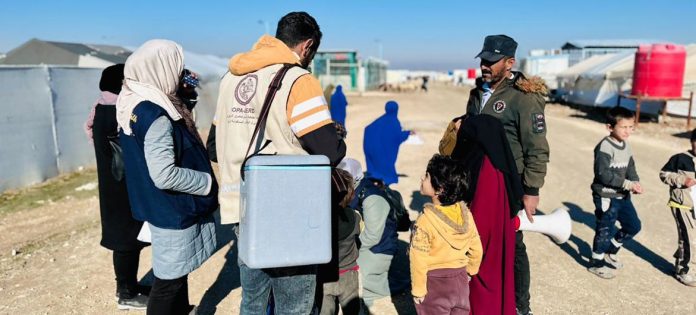A cholera outbreak was identified in the camp in early October and later confirmed by laboratory tests. Due to the lack of a specialized treatment center for acute watery diarrhea in Al Hol, the UN Children’s Fund, UNICEF, emphasizes the urgent need to vaccinate as many people as possible.
“For the first time, we have received the cholera vaccine from northwest Syria to the northeast to vaccinate individuals in Al Hol camp, despite the ongoing security issues in the country. We were able to reach the people and administer the vaccine,” explained UNICEF health and nutrition officer Khourchid Hasan to UN News.
Mr. Hasan acknowledged the efforts of the authorities in Damascus and the local authorities in northeast Syria for facilitating the delivery of vaccines to the gates of Al Hol, which is under the control of the Kurdish-backed Syrian Democratic Forces (SDF).
Despite social media threats last December, which temporarily restricted access to Al Hol for three days, Mr. Hasan assured that the vaccination campaign will continue without interruption.
So far, at least 14,000 people have been vaccinated against cholera. Vaccination teams are working diligently during the holiday season to provide life-saving treatment to children and caregivers.
Vaccinators move through the camp’s tents, urging families to come forward and receive their vaccination. The vaccine offers protection against cholera, a disease that can be fatal if not treated promptly.
Insert picture of a woman wearing a jacket with a message in Arabic about free vaccination and safety guarantee.
The successful transportation of 25,000 vaccine doses from northwest Syria allowed the campaign to proceed. UNICEF’s social behavior change and risk communication teams have been instrumental in raising awareness and building trust among Al Hol’s population.
Al Hol has been home to the families of ISIL fighters, displaced individuals, and refugees affected by the Syrian conflict. The conditions in the camp have raised concerns among human rights experts, with reports submitted to the Human Rights Council.
The camp houses foreign nationals who were coerced or voluntarily travelled to join ISIL fighters. Cholera was identified in the camp for the first time in 2022, with the current outbreak attributed to various factors including funding deficits and poor living conditions.
Several UN agencies, including UNFPA and WHO, are present in Al Hol along with the UN Children’s Fund. The need for healthcare resources, especially for non-communicable diseases, remains high.
Despite the challenges, efforts continue to address the health needs of the population in Al Hol and Roj camps in Al-Hasakeh governorate.




